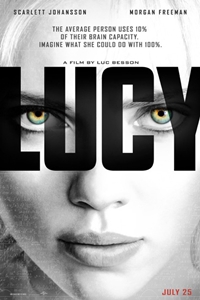 Lucy
Lucy
Starring Scarlett Johansson, Morgan Freeman, and Min-sik Choi
Directed by Luc Besson
Rated R
Run Time: 89 minutes
Genre: Action/Sci-Fi
Opens July 25th
By Eric Forthun of Cinematic Shadows
As human beings, we use roughly ten percent of our brain’s capacity. The only mammal more advanced than that is the dolphin, which can use twenty percent of its brain and scan the oceans with sonar more powerful than anything created by man. So what could happen if a human had the ability to access 100% of their brain capacity? That’s the central premise of Lucy, Luc Besson’s absurd film revolving around a drug smuggling ordeal leading to a manic force in the form of a badass Scarlett Johansson. How far the film extends the central theme of the story is remarkable, growing increasingly incredulous and ridiculous to the point of nonsensicality. If the story focused on Johansson’s titular character actually turning into a dolphin when her brain hits 20%, the film would feel the same tonally and conceptually. But to start the story, Lucy (Scarlett Johansson) is studying in Taiwan and with her boyfriend Richard, who’s involved with shady deals. He’s been paid $1,000 to take a briefcase to a businessman, no questions asked.
Lucy is sent as his “surrogate,” handcuffed to the locked case not knowing what could possibly be inside. Inside the building, armed men sense something is wrong, grab her, and take her to Mr. Jang (Min-sik Choi). He’s a ruthless man that kills without remorse and has riot shields on hand in case things ever go south. You know how businessmen can be. Lucy, trapped and powerless, opens the case on Jang’s instruction and finds four bags of a blue powder. It’s a synthetic drug called CPH-4, based on the chemical released within a pregnant woman’s body that gives the baby the power to grow bones and form itself. CPH-4 isn’t a sexy name, though, since they want to sell the drugs on the streets in countries like Germany, France, Italy, and the United States. In order to do so, they need to smuggle the drugs across half of the world, and the only way to do that quickly is through people. Lucy is knocked out and prepared to board a plane before she is beaten by her captors, releasing the drug in her system through the bag in her abdomen.
She gains the ability to read minds, control matter, time, and space, and basically do everything you can possibly imagine. The biggest problem with a premise like this is that there is innately no external conflict for a character as almighty as Lucy. The film, then, should internalize the conflict in order to maximize the empathy from the audience toward the characters. But Besson’s film focuses on the sizzling action and pizazz that comes from a woman who can kick ass and have the powers of a god. That may sound riveting, but it becomes exhausting and monotonous when the action looks particularly hokey and contrived. These are scenes that have been achieved far better and creatively in films like The Matrix and even other Besson films like Taken and The Fifth Element. There’s a car chase at the beginning of the film’s third act that is exciting and tense, but once again, it becomes rudimentary when the audience knows that Lucy will obviously survive since she understands how everything in the world works.
The central idea, quite simply, turns out boring. The film attempts to elaborate on the internal battle for Lucy losing touch with humanity but fails to communicate that strongly enough to the audience. She cries when calling her mother despite no longer feeling physical pain and she kisses a man before saying that he acts as a reminder. Of either her past emotional self, or the need for the story to have a love interest. Johansson plays these elements fine enough even if the film’s first thirty minutes ask her to overact to the point of cheesiness. She’s the only acting force behind the film, so her character being thinly sketched makes the audience wonder why exactly they are watching a film centered on her. What’s worse is that the film creates wonky rules based around real-world physics and reality that makes the premise even more implausible and frustrating. Since we don’t understand Lucy as a person and all of her capabilities, the film can make up everything as it goes along. I suppose if I had the mental capacity of Lucy herself, I would be able to understand all of the film’s absurdity and mindlessness.









